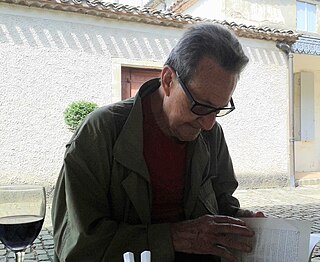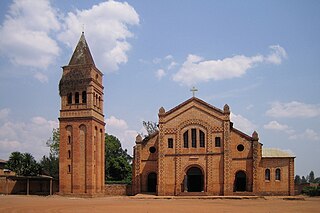Related Research Articles
Agathe Uwilingiyimana, sometimes known as Madame Agathe, was a Rwandan political figure. She served as Prime Minister of Rwanda from 18 July 1993 until her assassination on 7 April 1994, during the opening stages of the Rwandan genocide. She was also Rwanda's acting head of state in the hours leading up to her death.

This is a bibliography for primary sources, books and articles on the personal and general accounts, and the accountabilities, of the 1994 Rwandan genocide.

The Lion, the Fox & the Eagle: A Story of Generals and Justice in Rwanda and Yugoslavia is a non-fiction book by Canadian journalist Carol Off. The hardcover edition was published in November 2000 by Random House Canada. The writing was favourably received and the book was short-listed for the Shaughnessy Cohen Award for Political Writing. With numerous interviews and extensive research behind it, the book presents biographies of three Canadians in United Nations roles in the 1990s: Roméo Dallaire, Lewis MacKenzie, and Louise Arbour.

The Coalition for the Defence of the Republic was a Rwandan far-right Hutu Power political party that took a major role in inciting the Rwandan genocide.

René Lemarchand is a French-American political scientist who is known for his research on ethnic conflict and genocide in Rwanda, Burundi and Darfur. Publishing in both English and French, he is particularly known for his work on the concept of clientelism. He is a Professor Emeritus at the University of Florida, and continues to write, teach internationally and consult. Since retiring he has worked for USAID out of Abidjan, Côte d'Ivoire as a Regional Consultant for West Africa in Governance and Democracy, and as Democracy and Governance advisor to USAID / Ghana.
Hutu Power is an ethnic supremacist ideology that asserts the ethnic superiority of Hutu, often in the context of being superior to Tutsi and Twa, and therefore, they are entitled to dominate and murder these two groups and other minorities. Espoused by Hutu extremists, widespread support for the ideology led to the 1994 Rwandan genocide against the Tutsi and the members of their families, the moderate Hutu who opposed the killings, and the Twa, who were considered traitors. Hutu Power political parties and movements included the Akazu, the Parmehutu, the Coalition for the Defence of the Republic and its Impuzamugambi paramilitary militia, and the governing National Republican Movement for Democracy and Development and its Interahamwe paramilitary militia. The belief in the theory that Hutu people are superior is most common in Rwanda and Burundi, where they make up the majority of the population. Due to its sheer destructiveness, the ideology has been compared to Nazism in the Western world.
The "Hutu Ten Commandments" was a document published in the December 1990 edition of Kangura, an anti-Tutsi, Hutu Power Rwandan-language newspaper in Kigali, Rwanda. The Hutu Ten Commandments are often cited as a prime example of anti-Tutsi propaganda that was promoted by genociders in Rwanda following the 1990 invasion by the Tutsi-dominated Rwandan Patriotic Front and prior to the 1994 Rwandan genocide. The chief editor of Kangura, Hassan Ngeze, was convicted of genocide and crimes against humanity in 2003 by the International Criminal Tribunal for Rwanda and was sentenced to 35 years' imprisonment.

Christianity is the largest religion in Rwanda, with Protestantism and Catholicism being its main denominations. Around 3% of the population claims no religious affiliation, while another 3% practices other religions including traditional faiths. Approximately 2% of the populace is Muslim.
Eric Markusen was Professor of Sociology and Social Work at Southwest Minnesota State University in Marshall, Minnesota, USA, and Research Director of the Danish Center for Holocaust and Genocide Studies in Copenhagen. He also served as Associate Editor of the two-volume Encyclopedia of Genocide, published in 1999.

Howard Adelman was a Canadian philosopher and university professor. He retired as Professor Emeritus of Philosophy at York University in 2003. Adelman was one of the founders of Rochdale College, as well as the founder and director of York's Centre for Refugee Studies. He was editor of Refuge for ten years, and since his retirement he has received several honorary university and governmental appointments in Canada and abroad. Adelman was the recipient of numerous awards and grants, and presented the inaugural lecture in a series named in his honor at York University in 2008.
Carol Louise Edgarian is an American writer, editor, and publisher. Her novels include Rise the Euphrates,Three Stages of Amazement, and Vera. She is the co-founder and editor of the non-profit Narrative Magazine, a digital publisher of fiction, poetry, non-fiction, and art; and founder of Narrative for Schools, whose programs provide free learning and teaching resources for students and educators.

Jerry Robert Kajuga was national president of the Interahamwe, the group largely responsible for perpetrating the Rwandan genocide against the Tutsi people in 1994. Born to a Tutsi father and a Hutu mother, Kajuga concealed his background and presented himself as being of pure Hutu descent
Rwandan genocide denial is the pseudohistorical assertion that the Rwandan genocide did not occur, specifically rejection of the scholarly consensus that Rwandan Tutsis were the victims of genocide between 7 April and 19 July 1994. The perpetrators, a small minority of other Hutu, and some fringe Western writers dispute that reality.
During the Rwandan genocide of 1994, over the course of 100 days, up to half a million women and children were raped, sexually mutilated, or murdered. The International Criminal Tribunal for Rwanda (ICTR) handed down the first conviction for the use of rape as a weapon of war during the civil conflict, and, because the intent of the mass violence against Rwandan women and children was to destroy, in whole or in part, a particular ethnic group, it was the first time that mass rape during wartime was found to be an act of genocidal rape.
Timothy Paul Longman is a professor of political science and international relations at Boston University. A protege of Alison Des Forges, he is recognized as one of the top authorities on the Rwandan genocide and its legacies.

In Praise of Blood: The Crimes of the Rwandan Patriotic Front is a 2018 non-fiction book by Canadian journalist Judi Rever and published by Random House of Canada; it has also been translated into Dutch and French. The book describes alleged war crimes by the Rwandan Patriotic Front (RPF), Rwanda's ruling political party, during its ascent to power in the 1990s.
Susan Michelle Thomson is a Canadian human rights lawyer and professor of peace and conflict studies at Colgate University. She worked in Rwanda for years in various capacities and is known for her books focusing on the post-genocide history of the country, which have received good reviews. Although she initially supported the ruling Rwandan Patriotic Front (RPF), Thomson later reevaluated her position.

Who Must Die in Rwanda's Genocide?: The State of Exception Realized is a 2015 non-fiction book by American politician Kyrsten Sinema. Published by Lexington Books, the book is a qualitative study on the history of human rights violations in Rwanda, culminating with the Rwandan genocide of 1994. The book's text is derived from Sinema's 2012 doctoral thesis, Who Must Die: The State of Exception in Rwanda's Genocide, presented to fulfill her Doctor of Philosophy (PhD) in justice studies from Arizona State University.

Amelia Barbieri was an Italian nurse, midwife, and lay missionary. After a career in Italy, in 1983 rather than retire she moved to Rwanda. She worked as a nurse in Rugabano and then founded a maternity center in Shyorongi. Later she moved to Byumba where she cared for abandoned children. In 1992, she founded an orphanage in the village of Muhura, in the Gatsibo District of the Eastern Province. The orphans were endangered during the Rwandan genocide but Barbieri refused to leave without them. With help from humanitarian Maria Pia Fanfani they were temporarily moved to Uganda and then relocated to Verona, Italy. Her dedication to the children's welfare was honored by President Oscar Luigi Scalfaro, who conferred upon her the distinction Commendatore al Merito della Repubblica in 1995. When the genocide ended Barbieri returned to Rwanda and ran the orphanage until 2008. Because of failing health, she brought in assistants and worked with them until 2012 when her condition forced her to return to Italy.
Fatuma Ndangiza is a women's rights advocate, policy expert, and politician. As of January 2024, she is serving her second term as a Rwandan member of the East African Legislative Assembly. Born and raised in a refugee camp in Uganda, she returned to Rwanda during the civil war. Initially she settled in Byumba and led the SOS Ramira initiative to assist women and children in acquiring basic supplies and treatment to meet their needs. When the Rwandan Patriotic Front took control of Kigali, she moved to the capital and began working in the Ministry for Women and Family Promotion to provide support and relief to survivors and victims of the Rwandan genocide. She helped to create the National Women's Council and its regional and local frameworks to empower women to help them achieve political and economic parity through legal change and advocacy. She worked with the women's ministry until 2002.
References
- ↑ "Carol Pott".
- ↑ "Carol Pott". LinkedIn .
- ↑ Berry, John A., and Carol Pott Berry. 1998. Genocide in Rwanda: A Collective Memory. Washington, DC: Howard University Press.
- ↑ Pott, Carol. "Three Days of Terror in Kigali". The Washington Post, 12 April 1994, sec. A.
- ↑ Heartland Independent Bookseller List, bestseller, March 2006
- ↑ Pott, Carol. 2005.The Blue Pages: A Directory of Companies Rated by Their Politics and Practices. Sausalito, CA: PoliPointPress
- ↑ Crouse, Angie, with Pott, Carol, et al. contributors. 2010. The Blue Pages: A Directory of Companies Rated by Their Politics and Practices Revised Edition. Sausalito, CA: PoliPointPress.
- ↑ Rue '66 Archived 2021-02-28 at the Wayback Machine . Retrieved October 7, 2013.